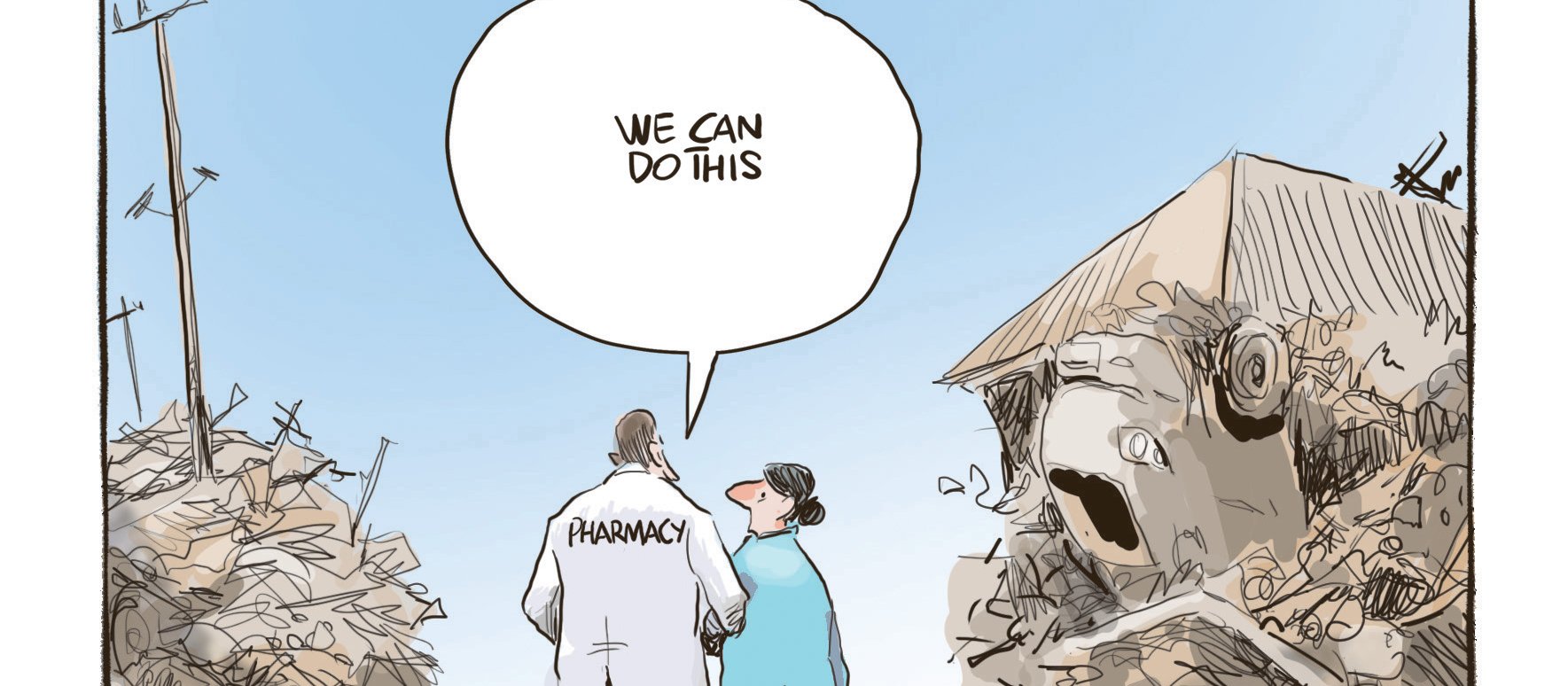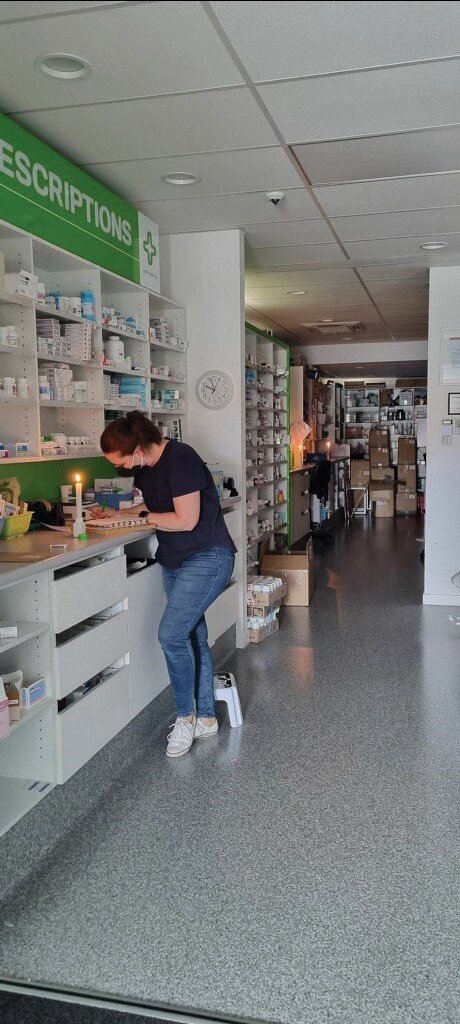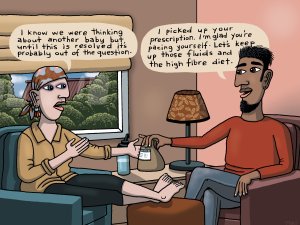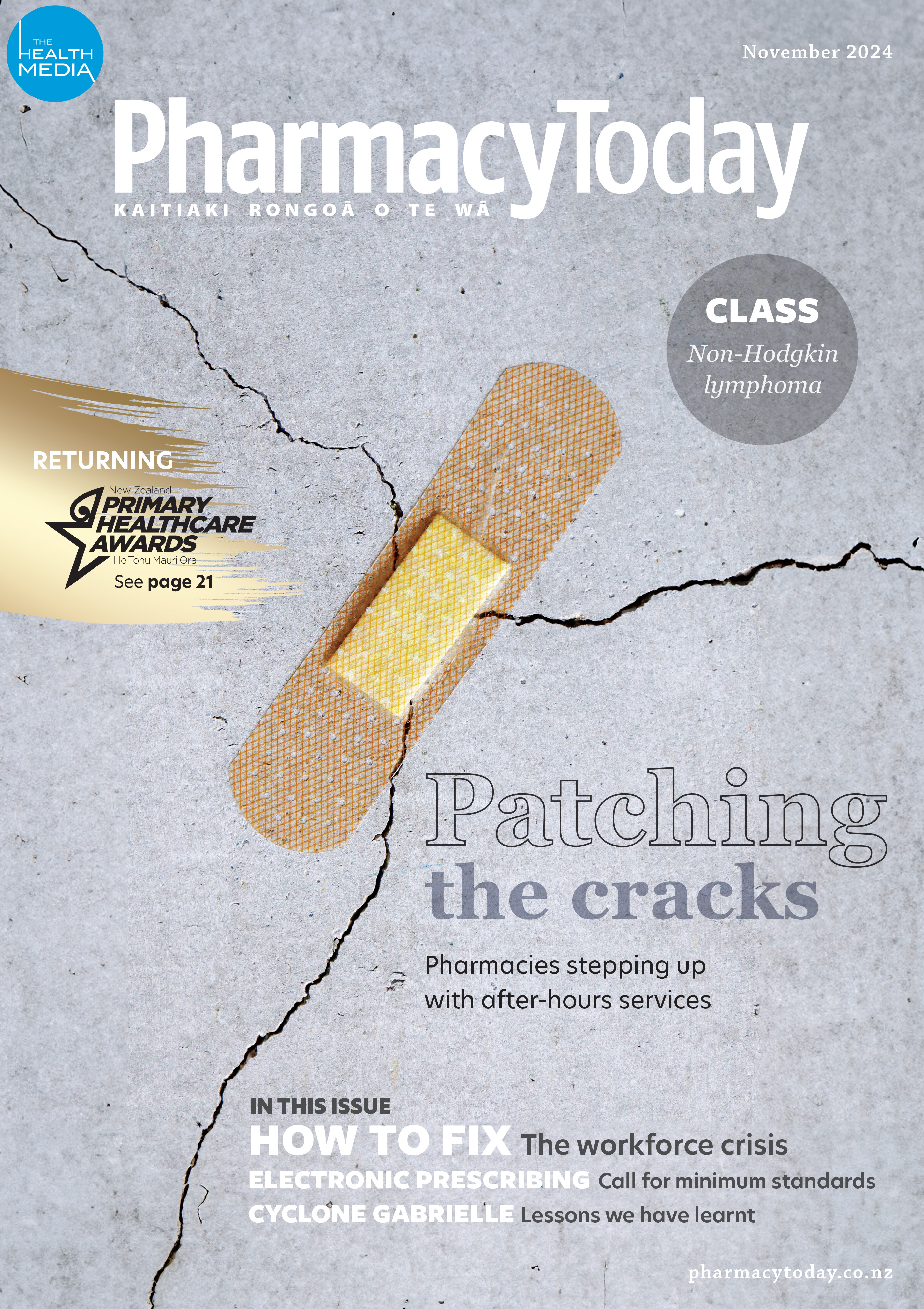Academic pharmacist Nataly Martini highlights the importance of understanding non-Hodgkin lymphoma and pharmacists’ roles in managing this condition
Pharmacies put up brave effort in face of cyclone
Pharmacies put up brave effort in face of cyclone

After Cyclone Gabrielle battered Aotearoa New Zealand’s northeastern regions last month, pharmacists in affected areas mounted a heroic effort to ensure their communities stayed supplied with vital medicines. Paulette Crowley and Jonathan Chilton-Towle report on some of those stories
The events of the week starting Monday 13 February are all a blur for Rebekah Taylor, the owner of Glenns Pharmacy in Taradale.
Anticipating that the approaching Cyclone Gabrielle would cause flooding, on the Monday, Ms Taylor prepared medicine deliveries for patients whose homes might be cut off.
The skies opened overnight and the next morning, after seeing the extent of the devastation on her drive to work, Ms Taylor made the call to close her pharmacy for the day.
She sent out an email notifying customers, but because phones and internet were down she had no way of knowing if anyone received it.
“It was horrific, what do you do when there’s no way of knowing what is going on out there?”
In nearby Gisborne, Grant Bramwell, owner of Bramwells Pharmacy, was evacuated at midnight after the river near his home burst its banks.
The floodwater inundated the lower storey of his house and flooded the basement and playroom. Thankfully, the living areas were left unscathed.
A week later, as of 21 February, Mr Bramwell was still unable to wash away the silt coating his possessions due to water restrictions.
“Most people have been pretty supportive, particularly in my personal situation. People have been coming around and helping out. It’s quite humbling,” he says.
Bramwells Pharmacy was not badly affected by flooding, except for losing phone lines, wi-fi and power.
This situation was shared by most pharmacists contacted in the storm-battered regions of Northland, the Hawke’s Bay and Tairāwhiti following the cyclone.
In Napier, the owners of Gee’s Pharmacy, Chris and Leanne Marshall, found a unique solution to their power problems.
Their friend Steve Charles was generous enough to volunteer his electric vehicle. Using a power inverter and an extension cord, the car battery provided enough energy to run a couple of tills in the pharmacy for about three hours a day, for three days.
The couple managed to get in touch with solar-panel installation company Solar Ready and the owner, Tony, agreed to come and install solar panels. The panels, plus a generator provided by another friend in Auckland, means the pharmacy now has enough power to operate fully, despite not yet being connected to mains power.
“If you came into the pharmacy now you wouldn’t know anything was happening…we just have to be careful not to run it down overnight,” Mr Marshall says.
Losing power for several days did mean Mr Marshall has had to replace his cold chain stock, but he says his insurance company was great and the claim has already been processed.
Losing power was also the biggest issue for Sean Shivnan, another Gisborne pharmacist.
“Fortunately it was only for 12 hours.” His pharmacy was operating by 4pm on the Tuesday without internet or EFTPOS, until EFTPOS became available on 18 February.
They created accounts so people could access their medicines and come back to pay when possible.
The emergency also showed the benefits of keeping data on hard drives. Local GPs had their systems in the cloud whereas Mr Shivnan’s pharmacy has a hard drive.
“The GPs were grateful for that as they didn’t know things like whether their patients were on 5mg or 10mg tablets,” he says.
“It’s organised chaos but we’re scrambling well. People scrambled really well, as you do on the fly. For a long time, everything was reactionary – even though you plan for it, you can’t plan for everything.”
Susie Farquhar and her team at Unichem Greenmeadows in Napier spent the first few days after the cyclone working in a dark dispensary lit only by candles and light from the windows.
Te Whatu Ora granted pharmacists the power to dispense emergency medicines supplies without a prescription in the disaster-affected areas.
But this is a complex process and many of the patients coming in were overwhelmed by what had happened.
Many patients could not remember what medicines they were taking and, because there was no power or phones, it wasn’t possible to look this up on the computer. Many patients coming in were also not regular customers.
Ms Farquhar and her team did what they could to help, consulting with patients to find out what would be appropriate for their conditions and digging up old paper prescriptions out of their files.
This continued until they were able to get power from an ancient generator on a neighbouring property, that had not been serviced since 2015. After cutting down a bush and through a fence with bolt cutters, it took an electrician a day to get the old machine working for the pharmacy.
Ms Farquhar also donated thousands of dollars’ worth of medical supplies, such as hand sanitiser and insect repellant, to support the nearby Puketapu settlement, which was devastated by the storm.
In the aftermath of the cyclone she has seen a huge increase in demand for treatments for eye and skin infections and gastro bugs, a consequence of contact with contaminated stormwater.
COVID-19 also appears to be surging again in the community, with many patients and some local doctors falling sick recently. There has been a massive increase in demand for COVID antivirals.
Because roads were cut off, medicine supplies also initially could not get through from the business’ usual supplier ProPharma, and the pharmacy had to pick up what it needed from the office of CDC Pharmaceuticals, which fortunately is in Napier.
Marty Kennedy, the co-owner of Pharmacy Three Rivers in Gisborne, had no power for about 36 hours.
They closed on the Tuesday morning but came into the pharmacy to process some prescriptions manually for people who desperately needed medicines.
By the Wednesday, the pharmacy was open on reduced hours, as were the doctors in the area.
Mr Kennedy and his team have been generating prescriptions for doctors off their own records for patients, and then having doctors sign them off.
“Doctors are learning how to write a prescription on a piece of paper, which has been interesting.”
Te Whatu Ora waived the $5 prescription copayment for the cyclone-affected regions for four weeks, but Three Rivers Pharmacy did not hear this had happened until the Sunday.
“A whole bunch of people had paid for their prescriptions when they didn’t need to,” Mr Kennedy says, adding he is unsure how they can get their money back.
Like Mr Shivnan, Mr Kennedy ran an accounts system for patients.
The pharmacy also gave people cash loans to buy groceries. Now the EFTPOS is back up and running, they are giving out cash from people’s cards.
Water supplies were also problematic, so Mr Kennedy bought some water to make up prescriptions.
Despite tragedy, most people are in good spirits, he says.
“Patients had been good and on the whole very good and appreciative and understanding of medicine supplies being limited.”
In Northland, Viv Bath, the owner of Kaeo Chemist, lost power and has had shop window lights destroyed by water. Her microwave and fridge also “blew out” and need to be replaced.
However, the fact her pharmacy still had old-fashioned copper wires providing internet and phones, instead of the new fibre cables, proved to be a godsend as her communications were not disrupted.
She says many of her customers are fed up with not having power and water for the past week.
One woman who just wanted someone to talk to, came in to have her passport photo taken and ending up staying to make coffee for everyone in the pharmacy.
My staff have been really showing their resilience. There is a lot of anxiety out in the community. We’re doing the best we can in a bad situation
Many pharmacy staff have also been unable to come into work because of blocked roads or their houses being damaged.
While Ms Farquhar only has one staff member in this situation, by contrast, Mr Bramwell only has about 70 per cent of his staff working, as of 21 February, with some on holiday and some off sick.
“My staff have been really showing their resilience. There is a lot of anxiety out in the community. We’re doing the best we can in a bad situation,” he says.
The cleanup has led to many instances of locals working together to support each other and the pharmacy sector has been no different.
Green Cross Health’s Wellington regional manager Bronwen Shepherd has been using her connections in the Hawke’s Bay to organise support for pharmacies that need it, in collaboration with Health Hawke’s Bay.
Through a friend at the Port of Napier she was able to get access to generators for several pharmacies.
She also put out a call for volunteers to support pharmacies in the region with the increased workload they will face as they struggle to catch up in the coming weeks and months.
Ms Shepherd has had 12 pharmacists contact her to volunteer so far, and she has put them in touch with Health Hawke’s Bay which is currently working out how best to deploy them.
Pharmacists can volunteer by visiting bit.ly/3Igg2B8.
Ms Shepherd says Hawke’s Bay pharmacies will continue to need support and urgently need relief.
“It’s really important that the teams get time off to come to terms with what has happened in the community.”
And in Gisborne, Sarah Kohn, the dispensary manager at Pharmacy 53, has been acting as an informal liaison between GPs, pharmacists and Te Whatu Ora. This was a role she also performed before the pandemic for vaccinations.
Pharmacy 53 owner Nigel Campbell paid her wages while she carried out the role and there has been no other funding.
Te Whatu Ora Tairāwhiti took the lead for all the health organisations. They started off having three meetings with health and community representatives a day.
The first meetings were to find out what had happened, what the problems were and what was needed, and this later moved to identifying problems and finding solutions.
“The biggest problem was the lack of communication. It’s interesting when you’re trying to get across to outside agencies,” Ms Kohn says.
“It took a while for people to get their heads around the fact that no comms meant no comms, and there was no point in sending emails. People were still trying to send us stuff through.”
“As each day went past, the health response got more organised – everyone did a really good job.
“After the meeting I would drive around to all the pharmacies and update them on things like critical stock issues and to make sure everyone was supporting each other,” she says.
In Taradale, Ms Taylor also identifies lack of communication from Te Whatu Ora as a problem.
She says that, initially, pharmacists were invited to attend morning Zoom meetings but this was impossible for many without working internet access.






